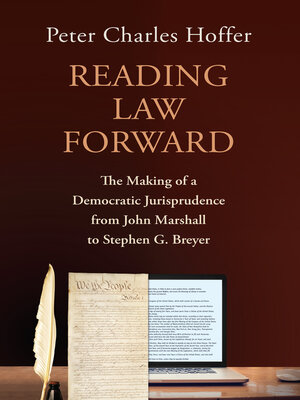Reading Law Forward
ebook ∣ The Making of a Democratic Jurisprudence from John Marshall to Stephen G. Breyer
By Peter Charles Hoffer

Sign up to save your library
With an OverDrive account, you can save your favorite libraries for at-a-glance information about availability. Find out more about OverDrive accounts.
Find this title in Libby, the library reading app by OverDrive.



Search for a digital library with this title
Title found at these libraries:
| Loading... |
In the current legal climate where "everyone is an originalist," conventional wisdom suggests that judges merely find law, rather than make it. Orthodox common-law jurisprudence makes fidelity to the past the central goal and criterion. By contrast, the alternative approach, "reading the law forward"—what some call judicial pragmatism or consequentialism—is viewed as heretical. Rather than mount a theoretical defense of a forward-thinking jurisprudence, legal historian Peter Charles Hoffer offers an empirical study of how this approach to constitutional interpretation actually leads to better law. Reading Law Forward looks at seven judges who exemplify this alternative jurisprudence: John Marshall, Joseph Story, Lemuel Shaw, Louis D. Brandeis, Benjamin Cardozo, William O. Douglas, and Stephen G. Breyer.
"In the hands of America's leading judges, a jurisprudence of reading law forward enabled courts to respond to the challenges of changing conditions. It kept law fresh. It promoted and still promotes the growth of a democratic society," Hoffer convincingly argues.






